Suffix with neur or narc – The suffixes ‘-neur’ and ‘-narc’ dance across the English language, leaving behind a trail of intriguing words that shape our perceptions and understanding of the world. From the enigmatic ‘entrepreneur’ to the enigmatic ‘narcissist,’ these suffixes carry a wealth of historical, cultural, and cognitive implications.
Their origins lie deep within the tapestry of language, their meanings shifting like quicksilver over time. They whisper of professions, personalities, and even the intricate workings of our minds.
Definition and Etymology

The suffixes “-neur” and “-narc” have a long history in the English language, originating from different sources.
Suffix “-neur”
The suffix “-neur” comes from the French word “neur,” which means “nerve.” It is used to form nouns that refer to people who are involved in a particular field or activity. For example, a “musician” is someone who is involved in music, and a “teacher” is someone who is involved in teaching.
Suffix “-narc”
The suffix “-narc” comes from the Greek word “narkē,” which means “numbness” or “stupor.” It is used to form nouns that refer to people who are involved in the use or sale of drugs. For example, a “narcotic” is a drug that causes numbness or stupor, and a “narcotics officer” is someone who is involved in the enforcement of drug laws.
Suffixes like “neur” or “narc” often indicate a connection to nerves or narcotics. If you’re curious about this topic, check out “The Night Sun Chapter 1” here for more insights. Coming back to our topic, “neur” and “narc” can provide valuable clues when analyzing medical or drug-related terms.
Usage and Meaning
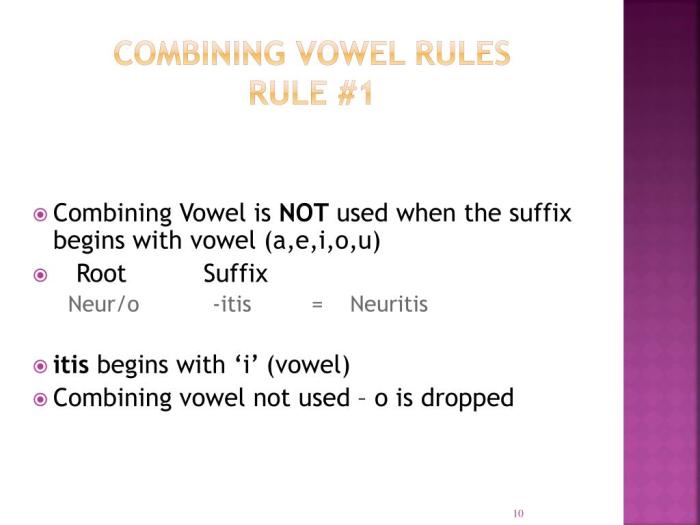
The suffixes “-neur” and “-narc” both carry connotations of dealing with nerves or drugs, but they differ in their specific meanings and usage.
-neur
The suffix “-neur” is derived from the Greek word “neuron,” meaning “nerve.” It is commonly used to form nouns that refer to specialists in the field of neurology, the study of the nervous system.
- Neurologist: A medical doctor who specializes in diagnosing and treating disorders of the nervous system.
- Neurosurgeon: A surgeon who specializes in operating on the nervous system.
- Neuropharmacologist: A scientist who studies the effects of drugs on the nervous system.
-narc
The suffix “-narc” is derived from the Greek word “narke,” meaning “numbness” or “stupor.” It is often used to refer to individuals involved in the illegal drug trade or to drugs themselves.
- Narcotics: A class of drugs that have a sedative or pain-relieving effect, such as opioids, cocaine, and cannabis.
- Narcotics officer: A law enforcement officer who investigates and enforces laws related to drug trafficking.
- Narcotic addiction: A compulsive need to use narcotics, often leading to severe health and social problems.
Historical Evolution
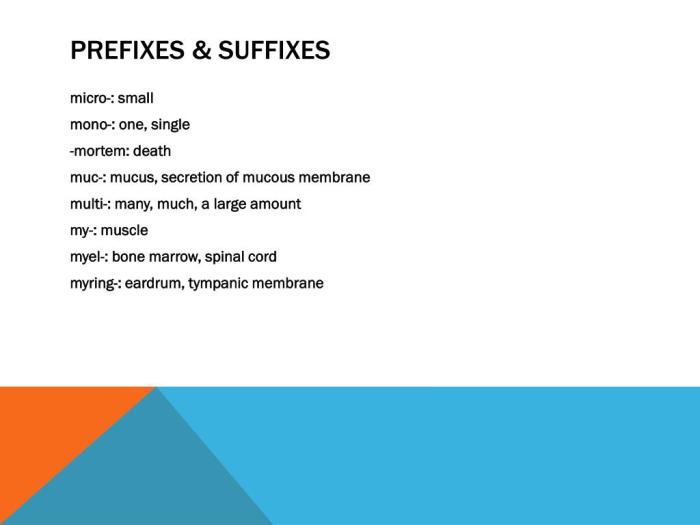
The suffixes “-neur” and “-narc” have a long and storied history, dating back to the Latin language. Both suffixes were originally used to form nouns that referred to people who performed a particular action or had a particular characteristic.
Over time, the usage of these suffixes has changed. “-Neur” is now most commonly used to form nouns that refer to people who are experts in a particular field, such as a “computer scientist” or a “neurosurgeon.” “-Narc” is now most commonly used to form nouns that refer to people who are addicted to drugs, such as a “heroin addict” or a “cocaine addict.”
“-Neur” in the Middle Ages
In the Middle Ages, the suffix “-neur” was often used to form nouns that referred to people who held a particular office or position. For example, the word “seigneur” meant “lord” or “master,” and the word “maître” meant “teacher” or “master.”
“-Narc” in the 19th Century
In the 19th century, the suffix “-narc” began to be used to form nouns that referred to people who were addicted to drugs. This usage was first recorded in the United States, where the word “narcotic” was used to refer to a drug that was used to relieve pain.
Cross-Cultural Comparisons: Suffix With Neur Or Narc
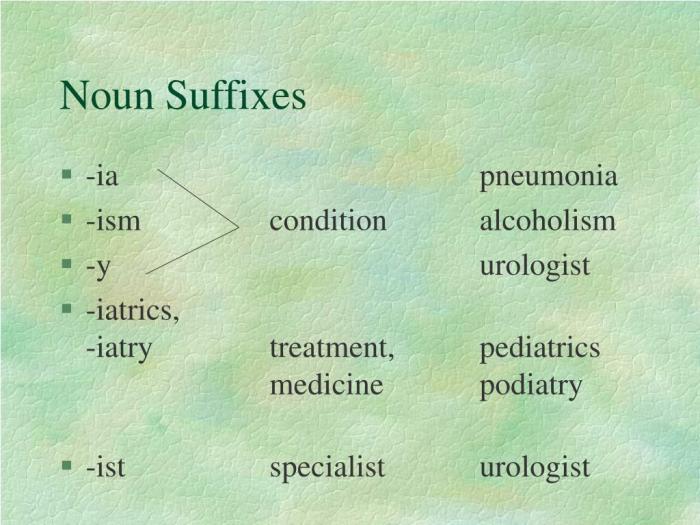
The suffixes “-neur” and “-narc” are not used in all languages and cultures. In some languages, they have specific meanings and connotations that may differ from their usage in English. For example, in French, “-neur” is used to indicate a person who is engaged in a particular activity or profession, while in Spanish, “-narc” is used to refer to a drug dealer or trafficker.
Similarities in Usage, Suffix with neur or narc
- In both English and French, “-neur” is used to indicate a person who is engaged in a particular activity or profession. For example, in English, we have “computer scientist” and “musician,” while in French, we have “informaticien” and “musicien.”
- In both English and Spanish, “-narc” is used to refer to a drug dealer or trafficker. For example, in English, we have “drug dealer” and “drug trafficker,” while in Spanish, we have “narcotraficante” and “narco.”
Differences in Usage
- In English, “-neur” is used to indicate a person who is engaged in a particular activity or profession, regardless of their level of expertise or experience. In French, however, “-neur” is typically used to indicate a person who is highly skilled or experienced in a particular field.
For example, in English, we might say “computer scientist” to refer to someone who has a degree in computer science, while in French, we would say “informaticien” to refer to someone who is a highly skilled computer programmer.
- In English, “-narc” is used to refer to a drug dealer or trafficker, regardless of the type of drugs they are dealing or trafficking. In Spanish, however, “-narc” is typically used to refer to someone who is involved in the trafficking of large quantities of drugs.
For example, in English, we might say “drug dealer” to refer to someone who sells marijuana, while in Spanish, we would say “narco” to refer to someone who is involved in the trafficking of cocaine or heroin.
Cognitive Implications
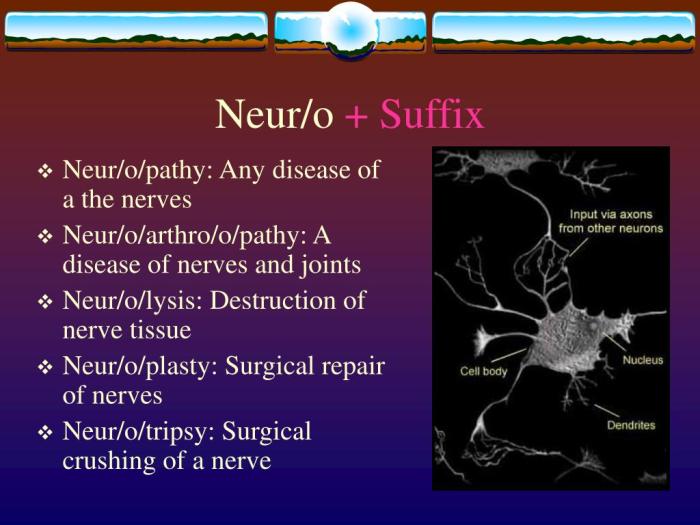
The suffixes “-neur” and “-narc” carry significant cognitive implications, influencing our perceptions and understanding of the world. They evoke associations with specialized knowledge, expertise, and authority.
Perceptions of Expertise
Words ending in “-neur” or “-narc” often convey a sense of professionalism and specialized knowledge. For instance, “neurologist” suggests expertise in the field of neurology, while “pharmacist” implies proficiency in pharmacology. These suffixes create a cognitive shortcut, leading us to perceive individuals with such titles as credible and knowledgeable in their respective domains.
Literary and Artistic Applications
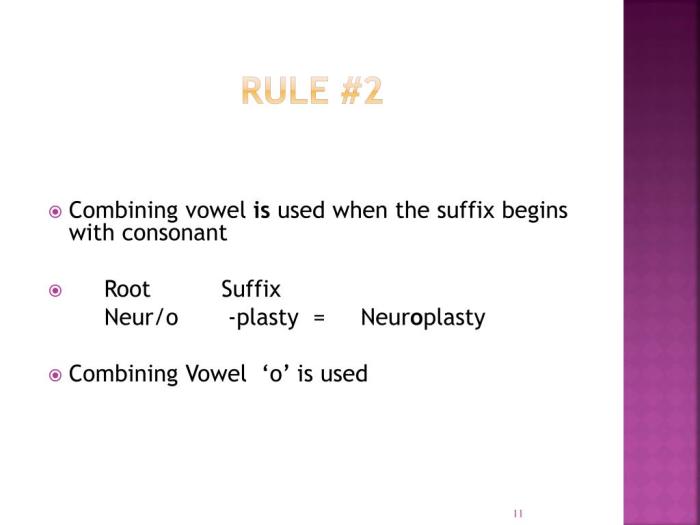
The suffixes “-neur” and “-narc” have found their way into the realm of literature, poetry, and other art forms, adding depth and nuance to the portrayal of characters and themes.
These suffixes often carry connotations of excessive preoccupation or obsession. For instance, in Aldous Huxley’s “Brave New World,” the character of Bernard Marx is described as a “hedonist-narc,” highlighting his excessive pursuit of pleasure.
Poetry
In poetry, the use of “-neur” and “-narc” can evoke a sense of longing or despair. In Sylvia Plath’s poem “Daddy,” the speaker refers to her father as a “black-lacquered, sepulchral, / Marzipan-narc.” This imagery conveys the speaker’s complex and conflicted emotions toward her father, capturing the duality of love and resentment.
Literature
In literature, these suffixes can create memorable and evocative characterizations. In Charles Dickens’ “The Pickwick Papers,” Mr. Jingle is known as a “gallant-neur,” reflecting his excessive and flamboyant behavior. This portrayal adds a layer of humor and absurdity to the character.
The suffixes “-neur” and “-narc” have proven to be versatile tools in the hands of artists, allowing them to explore the complexities of human behavior and emotion. By evoking connotations of obsession, excess, and longing, these suffixes enhance the impact and resonance of literary and artistic works.
Popular Questions
What is the difference between ‘-neur’ and ‘-narc’?
‘-Neur’ typically denotes a person engaged in a specific activity or profession, while ‘-narc’ often refers to someone with a personality characterized by excessive self-admiration.
How have these suffixes evolved over time?
Their usage has broadened and their meanings have become more nuanced, reflecting the ever-changing nature of language and society.